
F&I Manager and F&I Director Survey Results – 2022

Finance Manager Training
This survey was conducted by Finance Manager Training.
- Results analyzed by Data Analytics expert Munendra Parmar.
The survey revealed that finance managers and directors have experienced significant increases in annual income and PVR. The survey also delved into topics such as job appreciation and how respondents feel about the future of F&I.
One hundred and eighty-four current F&I Managers, F&I Directors, and Hybrid F&I/Sales People were surveyed, the results of which will be discussed in this article.
The survey revealed that finance managers and directors have experienced significant increases in annual income and PVR. The survey also delved into topics such as job appreciation and how respondents feel about the future of F&I.
One hundred and eighty-four current F&I Managers, F&I Directors, and Hybrid F&I/Sales People were surveyed, the results of which will be discussed in this article.

F&I Manager Income Is On The Rise
The percentage of F&I Managers earning more than $151,000 annually has risen dramatically since our last survey in 2017. At that time, only 19% of F&I Managers reported an income higher than $151,000.
In 2021, 56% of F&I Managers surveyed reported an income greater than $151,000 per year—an increase of 37%.
The data reveals that F&I Managers are now earning a similar amount to what F&I Directors earned during our 2017 survey. At that time, 58% of F&I Directors reported made over $151,000 annually.
As a whole, F&I continues to be a lucrative field, with 81% of F&I Managers reporting an income of $100,000 or greater.
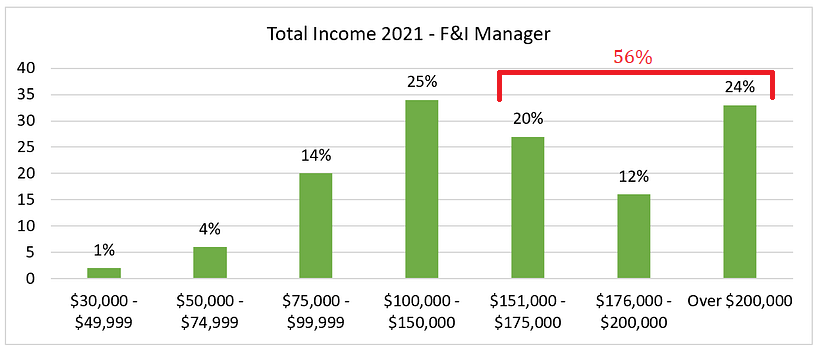
What did F&I Directors earn in 2021?
F&I Director income is also on the rise.
In our 2017 Survey, 58% of F&I Directors reported earning over $151,000 annually.
In 2021, 56% of F&I Directors reported earning over $200,000.
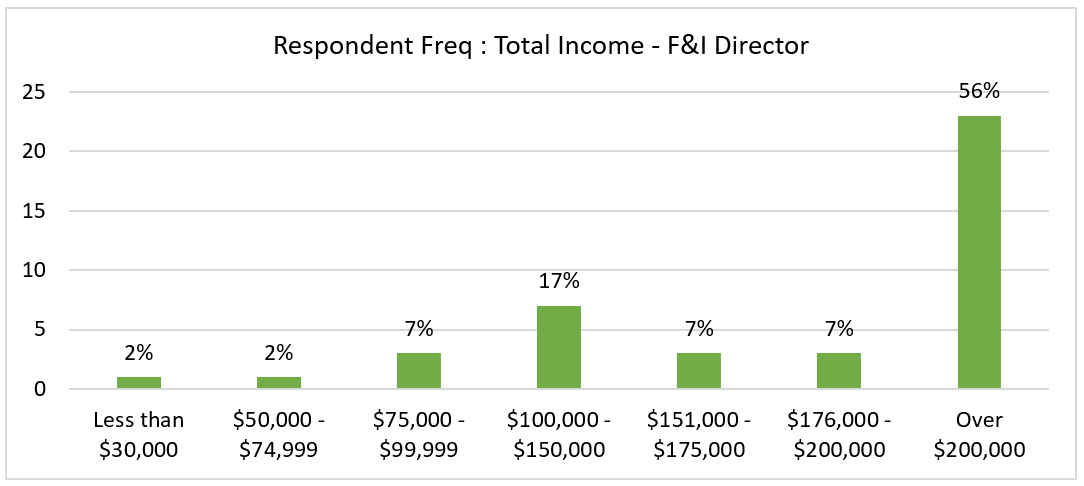
Where do F&I Managers earn the most?
We also asked respondents to indicate what region of the country they currently work. The result was similar to our previous survey, where it was shown that annual income was spread mostly evenly throughout the country.
In 2021, we found no statistically valuable difference between the number of F&I Managers reporting income in the higher ranges ($151,000 or more) and the region in which they live.
On the other end of the scale, the only region reporting income less than $50,000 per year was the South.
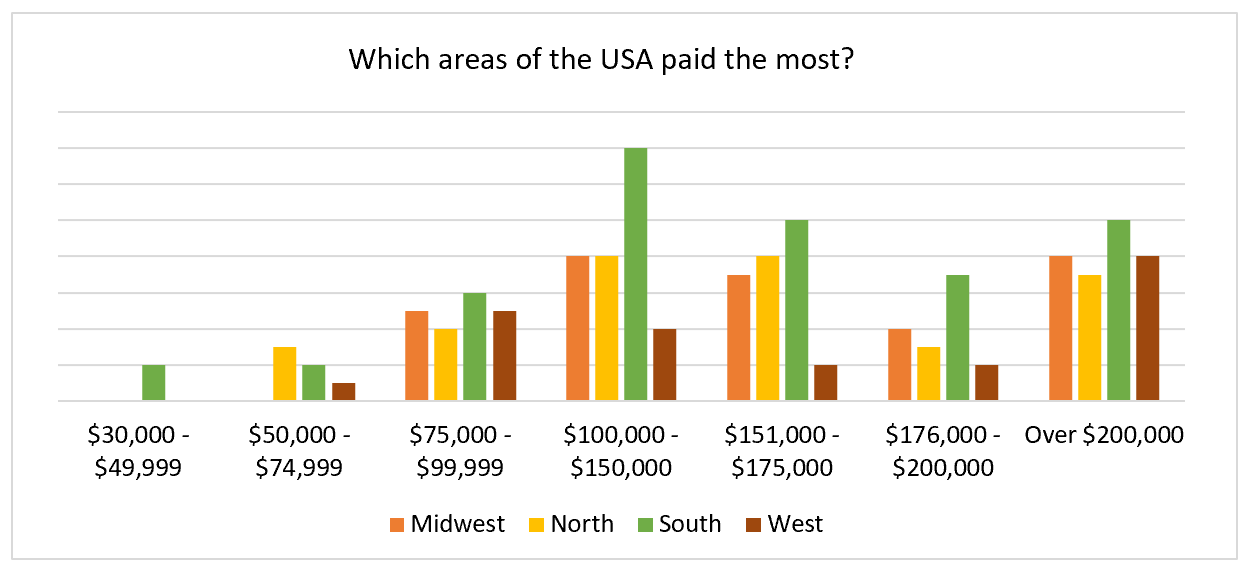
What is the average F&I PVR in 2022?
F&I Manager PVR has also increased dramatically since our last survey.
In 2017, only 20% of finance managers reported a PVR of more than $1,400, and 57% of those surveyed reported a PVR in the range of $950 and $1,400 per deal.
In 2021, we saw a substantial increase in both categories, with 62% of finance managers reporting a PVR of more than $1,500, and 91% reporting a PVR of at least $1,100 per deal.
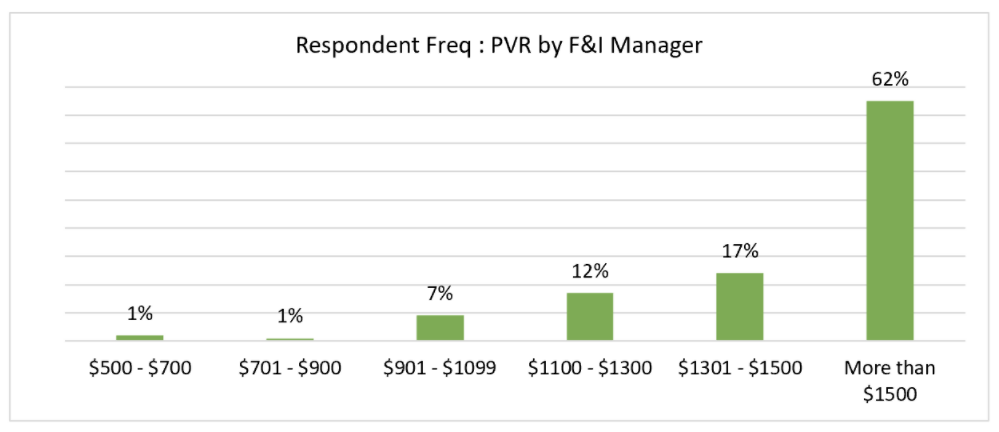
Do F&I Managers and F&I Directors Feel Appreciated?
To assess appreciation levels, we posed the following question: “Do you feel appreciated by those in charge at your dealership?”.
Respondents were given three choices: Yes, Somewhat, or No.
Looking at all responses irrespective of income or position, we found that the vast majority of F&I staff felt some level of appreciation from their superior(s).
In fact, only 14% of respondents reported feeling that they were not appreciated by those in charge at their dealership.
Another 45% said “Yes”, they do feel appreciated, and the remaining 41% stated they feel “somewhat” appreciated.
Without consideration for income, the responses from F&I Directors and F&I Managers were close to the entire group’s average, with Directors reporting slightly higher feelings of appreciation.
For the F&I Directors,
- 19 out of 41 responded “Yes” (46.34%),
- 16 out of 41 responded “Somewhat” (39.03%), and
- 6 out of 41 responded “No” (14.64%).
For the F&I Managers,
- 60 out of 138 responded “Yes” (43.48%),
- 59 out of 138 responded “Somewhat” (42.75%), and
- 19 out of 138 responded “No” (13.77%).
Hybrid F&I employees reported greater levels of appreciation, with 60% answering “Yes” with another 20% telling us that they felt somewhat appreciated. The remaining 20% answered, “No,” they don’t feel appreciated.
Does Income impact appreciation levels?
F&I Directors – Appreciation Levels by Total Income.
We were left with the question; Does how much an F&I Manager or F&I Director make, impact whether they feel appreciated?
The chart below shows the total number of responses for Directors, broken down by income, and correlated to whether the Director feels appreciated by their superiors.
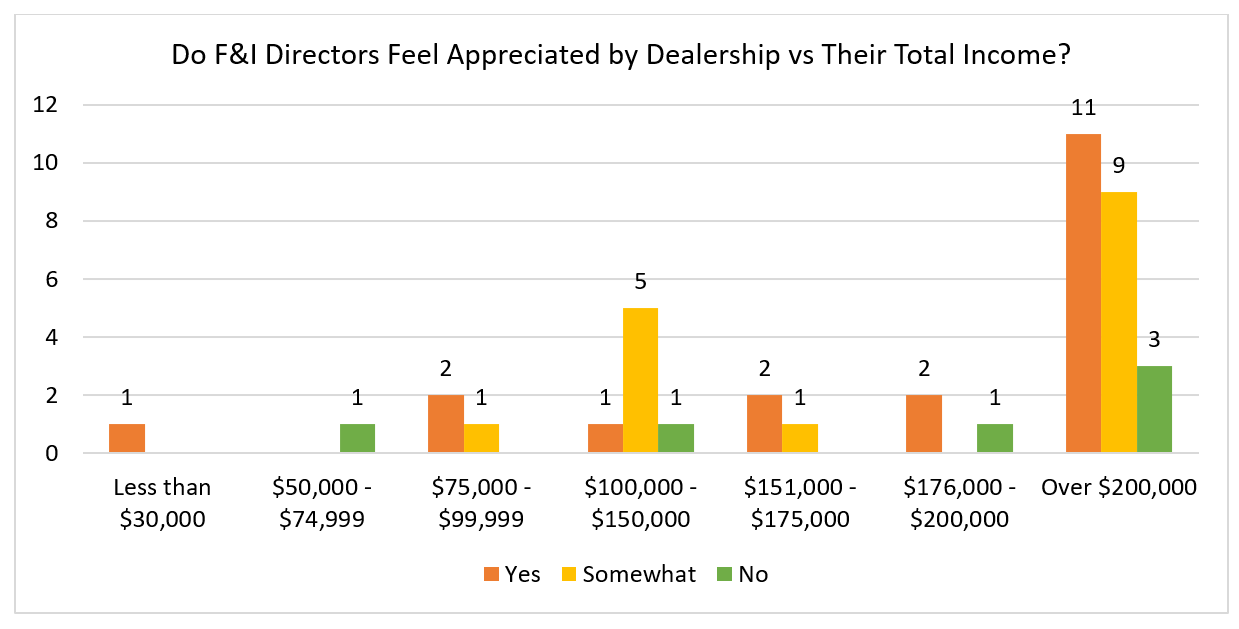
A first glance at the chart may lead you to think that F&I Directors earning over $200,000 a year have much higher levels of job satisfaction. However, this is a faulty perception perpetuated by the vast number of Directors who earn in excess of $200k. When we look at the percentages, the numbers tell a different story.
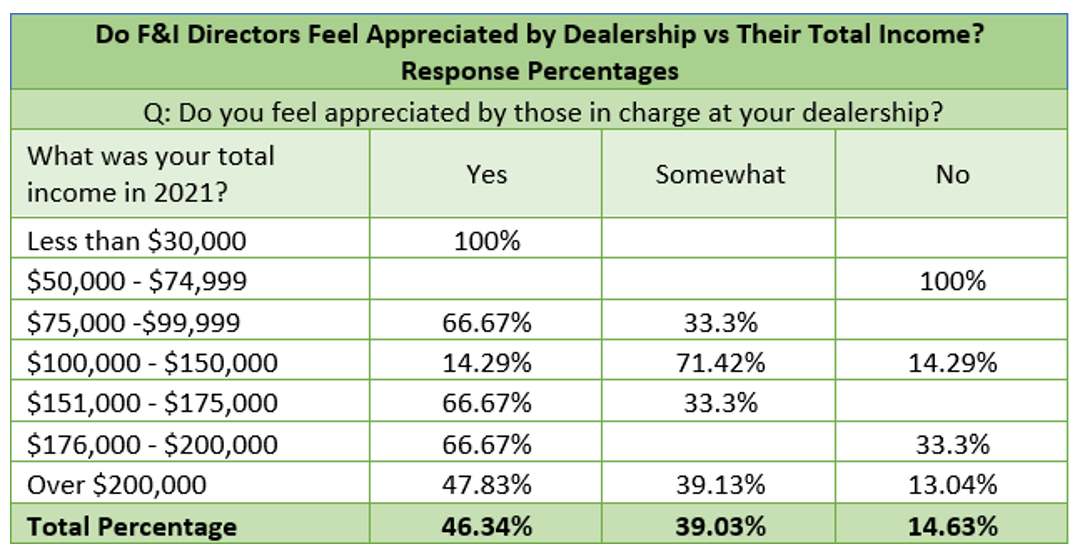
Does money buy appreciation? Not so much. Our survey reveals that F&I Directors who earned more than $200,000 annually report lower levels of appreciation (when looking at the definitive “Yes” column) than any income bracket other than $100k to $150k..
Those in the $100k to $150k bracket also reported significantly less “Yes” responses but had a higher percentage of “Somewhat” responses.
Irrespective of sample size, $151,000 to $175,000 appears to be the “sweet spot”, with 100% of F&I stuff in this bracket reporting that they feel at least “somewhat” appreciated.
F&I Managers – Appreciation Levels by Total Income.
The next group we looked at were F&I Managers, whose total incomes tend to be more spread out across different income ranges. The chart below shows the total number of responses, broken down by income, and correlated to whether the Manager feels appreciated by their superiors.
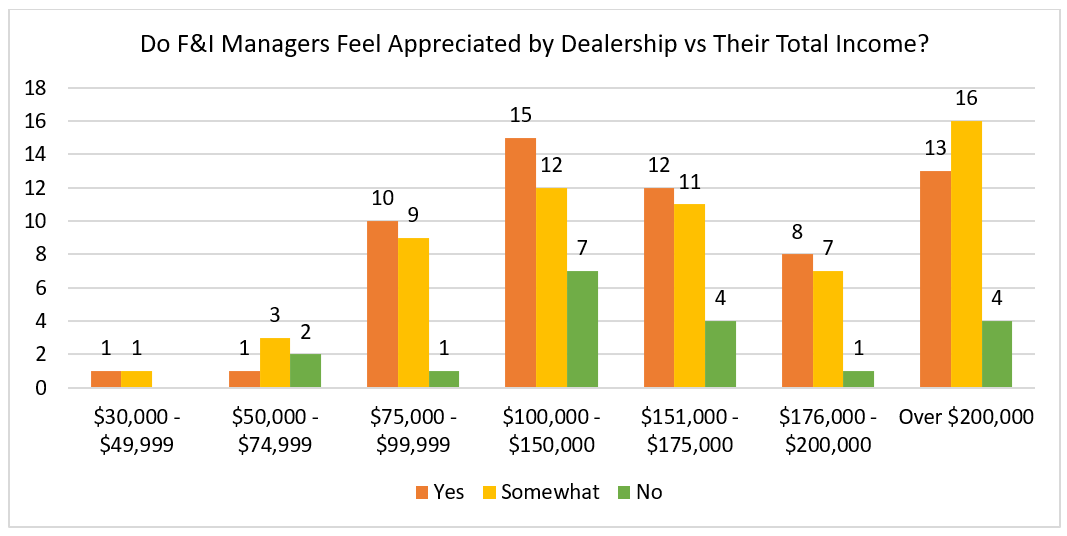
When we look at the percentages for the responses from F&I managers by smaller income ranges, we see that there is no consistent trend in relation to feelings of appreciation — other than the positive news that overall, more than 75% of F&I managers feel at least somewhat appreciated by the people in charge.
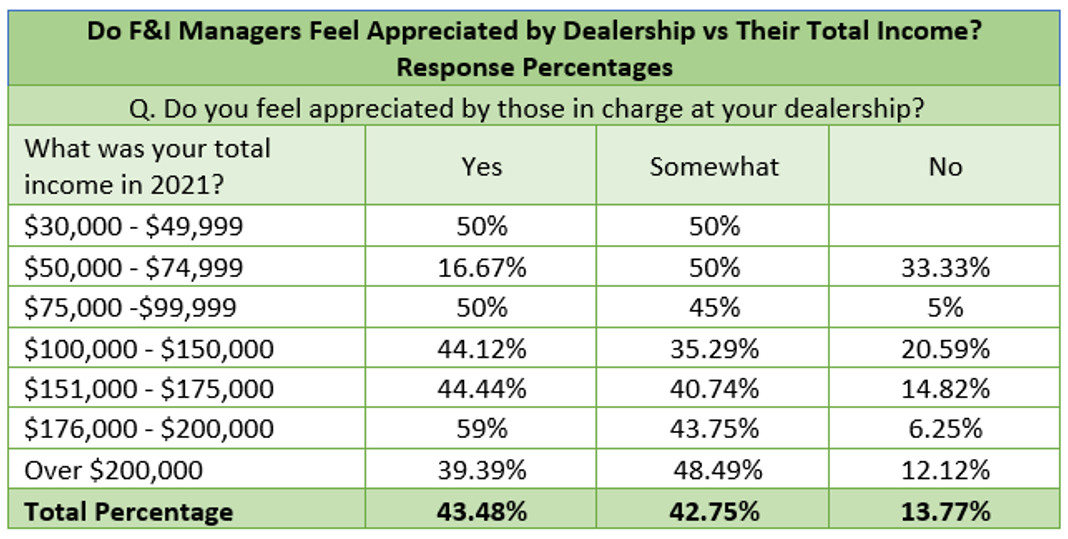
Because of the small sample sizes within each of these income ranges, we can get a better “picture” of overall feelings of appreciation if we use three broad income groups — under $100,000, $100,000 to $200,000, and over $200,000.
When we do this, we again see that (like F&I Directors), those who reported incomes higher than $200k reported feeling less appreciation from their superiors.
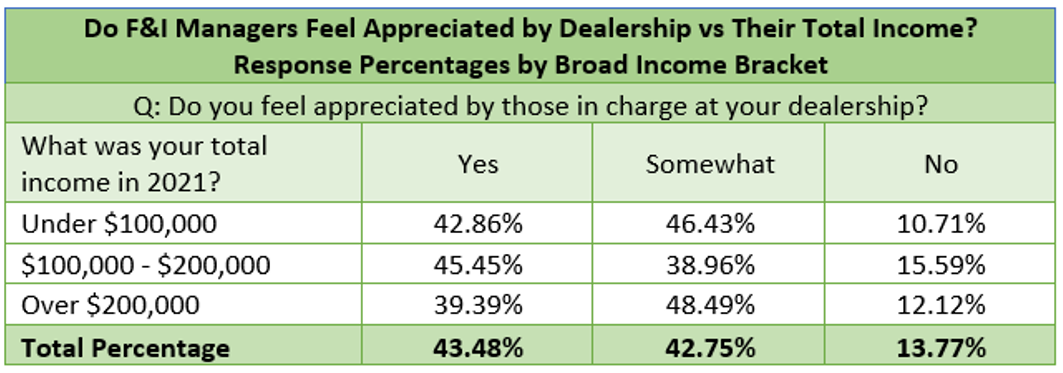
The income range in the middle ($100,000 to $200,000) answered “Yes” 45.45% of the time, and for the Under $100,000 group, 42.46% stated that they felt appreciated.
It is important to note that there are limitations to all studies and this is no exception. We only asked a simple question, “Do you feel appreciated by those in charge at your dealership?” and then looked for correlations with income levels. What we can not do with this information is infer causation. We can not say, “higher income levels cause F&I employees to feel less appreciated.”
It is likely that there are other contributing factors. For example, perhaps at higher income levels employees feel like they must work harder? Or maybe in our small sample of lower income level respondents, it’s small, family-owned dealership with a boss who has expert leadership skills.
These are purely random guesses. To determine causation, further studies would need to be done.
The one thing we do know, which is consistent with studies of human behavior, is that money alone does not make people feel appreciated or recognized for their hard work.
How Do F&I Managers and F&I Directors Feel about the Future of F&I?
Studies have shown that a positive view of the future and a sense of optimism are connected to overall life satisfaction. In our quest to learn more about how satisfied F&I employees are with their jobs, we decided to ask about their view of the industry’s future.
We asked the same 184 respondents this question: “How do you feel about the future of F&I?”
They were given a choice of five responses: Extremely Confident, Very Confident, Somewhat Confident, Not So Confident, or Not at All Confident.
When we look at the total responses irrespective of income or position, it was exciting to see that 91% of all the F&I employees we surveyed (no matter what they earned) are at least somewhat confident in the future of the industry, with 32.62% being extremely optimistic and 31.52% very optimistic.
Only 2.17% of respondents in our survey answered, “Not at all confident.” That’s good news.
The next thing we wanted to consider was whether the position an F&I professional held, again without consideration for income, was connected to confidence levels.
For the F&I Directors,
- 14 out of 41 responded “Extremely” (34.14%),
- 13 out of 41 responded “Very” (31.71%),
- 10 out of 41 responded “Somewhat” (24.39%),
- 2 out of 41 responded “Not So” (4.88%), and
- 2 out of 41 responded “Not at All” (4.88%).
For the F&I Managers,
- 44 out of 138 responded “Extremely” (31.88%),
- 43 out of 138 responded “Very” (31.16%),
- 39 out of 138 responded “Somewhat” (28.26%),
- 10 out of 138 responded “Not So” (7.25%), and
- 2 out of 138 responded “Not at All” (1.45%).
Between these two groups, directors do report slightly higher confidence and optimism about the future of the F&I industry, on the high end. However, a slightly higher percentage of F&I Directors as a whole (without consideration for income) said they were “Not at all confident” in the future of the industry. In other words, the two positions balance out and we do not see any statistically valuable difference.
For the last group – the hybrid F&I employees who also work part time on the salesfloor – none of the 5 respondents reported a lack of confidence in the industry. Within our small sample, 40% are extremely confident, 40% are very confident, and 20% are somewhat confident.
Like we did with appreciation levels, next we wanted to examine whether levels of optimism and confidence about the future of the F&I industry varied by total income.
F&I Directors – Optimism for Future by Total Income
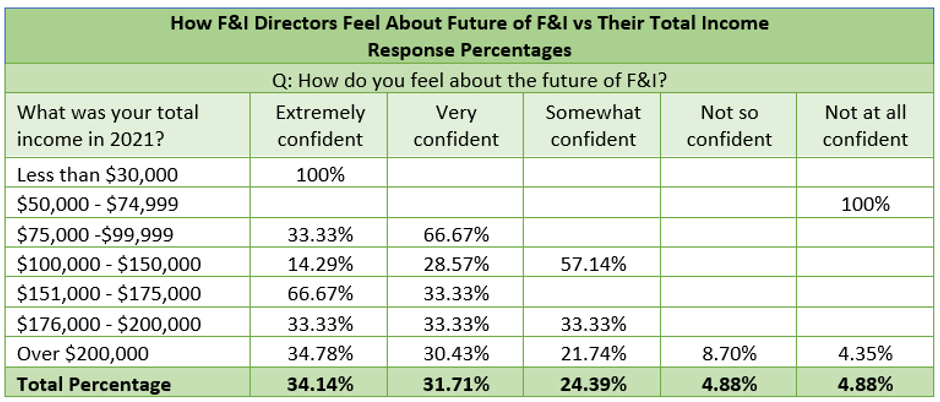
Because there are significantly fewer respondents at the lower income levels than those over $200,000, when we look at the percentages within smaller income ranges, it is hard to see if there is a trend. For example, there was only one F&I Director in the under $30,000 range and one in the $50,000 to $74,999 range — and their responses were polar opposites on the confidence continuum.
To create groups that could be better compared, we once again looked at three broader income ranges: under $100,000 (5 respondents), $100,000 – $200,000 (13 respondents), and over $200,000 (13 respondents).

Although there are still size differences within these groups of F&I Directors by income level, we can gather some information.
More respondents with incomes over $200,000 (34.78%) said they were extremely confident about the industry, compared to 30.77% with incomes in the $100,000 to $200,000 range. However, in the “somewhat confident” column, we see a response percentage of 38.46% of respondents earning between $100,000 and $200,000, versus only 21.74% for those earning more than that.
What also stands out is that out of all the respondents who answered, “Not so confident” or “Not at all confident,” more fall in the over $200,000 income range.
F&I Managers – Optimism for Future by Total Income
Next, we looked at F&I Managers, whose incomes are spread out more across the different income ranges. The chart below shows the responses from managers according to their total income.
To compare the survey responses, we looked at the percentage of responses within each income range for the reported confidence levels. First, we looked at the responses within the narrow income range brackets.
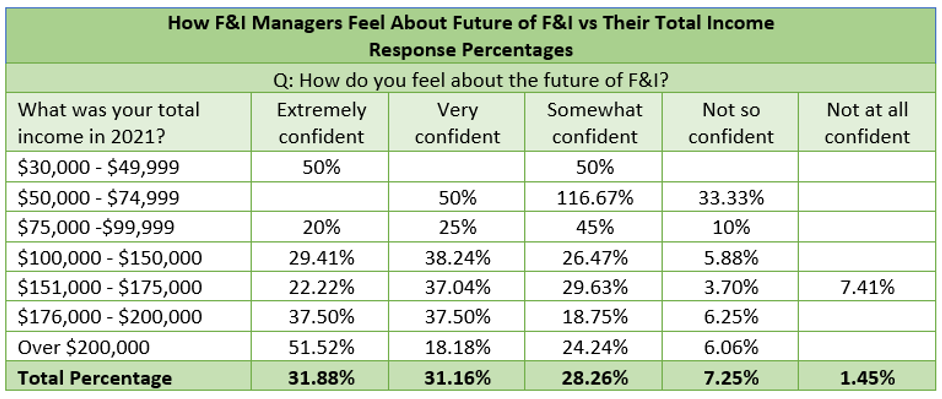
And then we looked at the response percentages with the three broad income groups.

With F&I Managers, we start to see a clear trend. For managers, as income goes up, they are more likely to report feeling extremely confident about the F&I Industry. Within our study, 51.52% of managers earning over $200,000 a year reporting extreme optimism and confidence.
Is There a Relationship Between Income and Confidence Levels?
Once we examined income levels by position, we wanted to know whether there was a correlation between income and how confident an F&I professional felt, no matter what the position they held. In terms of sample sizes, there were 34 respondents in the “under $100,000” group, 93 in the “$100,000 – $200,000” group, and 57 in the “over $200,000” group.
When we control for position, we again see a trend where F&I professionals are more likely to report that they are extremely optimistic about the industry, with the more money they make. In our survey, 43.85% of all respondents making more than $200,000 said they were “extremely confident” as compared to only 23.53% for incomes under $100,000. Respondents in the middle income group, also fell in the middle in reported confidence levels, with 29.03% answering, “extremely confident.”
For the under $100,000 bracket, 85.28% of respondents said they were at least somewhat confident in the future of F&I. For the $100,000 – $200,000 group, that percentage goes up to 92.55%, and for the over $200,000 professionals, 91.23% of them reported at least some level of confidence.
Would you like to participate in next years F&I Survey?
When it comes to surveys and studies, the more responses you receive, the greater the value of the data and the more you can draw from it.
For that reason, we encourage all F&I Staff to take part in our F&I Survey next year. To participate in next years survey, enter your email below and we will send you an email reminder when it is time to take part in the 2023 F&I Survey. Individual results are completely anonymous and we ask for no identifying information when filling out the survey.






